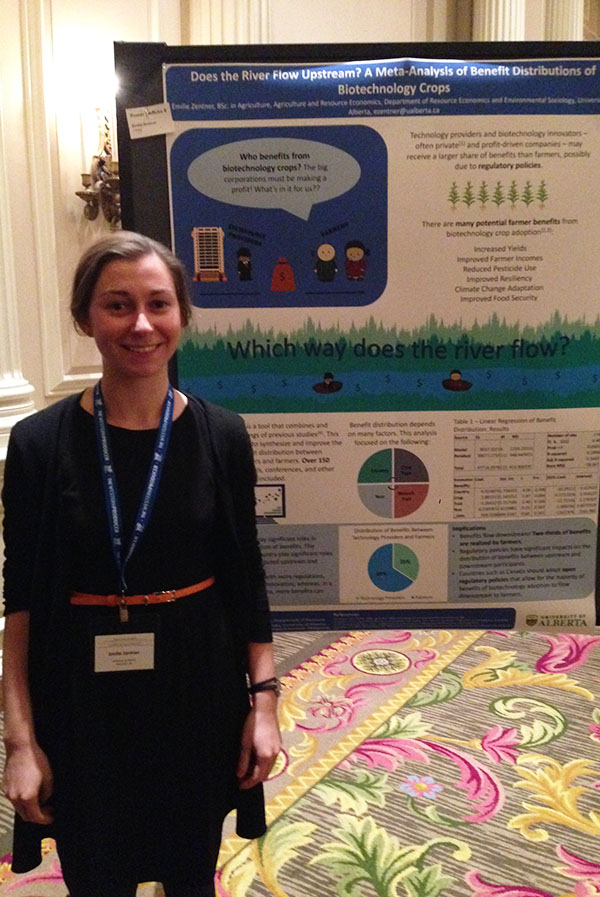
Emilie Zentner drew praise for a clear and straightforward explanation of her research in both her poster and oral presentation.
Undergraduate Emilie Zentner had never made an academic poster before she created one for a national competition in which all other entrants were either doctoral or master's students. Nor had she prepared the scientific vocabulary to talk about it in French, on demand. As for her experience in speedily creating policy briefs? None.
Yet the student in the Department of Resource Economics and Environmental Sociology (REES) sailed past those obstacles to take first place in the poster competition at the recent Canadian Agriculture Economists Society conference, and first place in an ad-hoc Agriculture and Agri-Food Canada policy brief competition, too.
"People said that I made it very clear what I wanted them to read and what was important," said Zentner, who is in her fourth year of Agricultural and Resource Economics. She knew her poster would be addressing scholars in the agri-food sector as well as many laypeople from the ranks of stakeholders and government officials.
So she created a simple layout and design for her poster that summarized her research on whether farmers or the technology providers benefit most from production of biotechnology crops-food crops developed using genetic modification techniques.
The data she used was from more than 150 existing studies about benefit distribution around the world that she analyzed last summer, through a stipend from the University of Alberta's Undergraduate Researcher Initiative.
The award, which enables undergraduate students to enrich their university experience through mentored, interdisciplinary research projects, supported a project co-supervised by Sven Anders, a food marketing economist in the Department of REES, and Matty Demont, of the International Rice Research Institute in Los Baños, Philippines.
While Zentner looked at four main variables in the data, she underscored one strong conclusion: globally, farmers receive two thirds of the benefits of biotechnology, and industry or technology providers receive just one third.
Intriguingly, she also found that the most important variable that governs who gets the most benefit is the level of regulation in the country in which biotechnology innovation is occurring.
"Where it's in a country with more regulations, that had a negative impact on farmer benefit and benefits went more to the innovator," said Zentner.
"In a more developed country, maybe they have more private research and development and stricter intellectual property laws, in which case the innovator would benefit more," she said, although she acknowledges that she needs more analysis to confirm that.
Zentner plans to prepare her research for publication in an academic journal and pursue graduate studies, but the recognition she achieved at the conference shows that she has already mastered many of the skills for communicating scientific ideas clearly.
During the poster competition, she was ranked as one the top three contenders, so was asked to present her findings orally. With just overnight to practice, she cut her poster down to an even more distilled size for the slides, and purposely spoke without notes so she could engage her audience with her confidence in her research.
She was similarly focused during the policy brief competition, for which students received a piece of data on an agricultural topic, had to research it more fully during the conference, summarize it in a policy brief that could be offered to a minister of agriculture, and formulate arguments to support recommendations for policy action.
Two final tools Zentner used to impress are directly tied to her decision to live in France for nine months last year, while still working on independent study courses through the Faculty of ALES. By immersing herself in French she became bilingual, and thus comfortable enough to present her poster to the many francophone attendees at the conference.
As she worked long distance under the direction of Sandeep Mohapatra, also of the Department of REES, she learned how critical it is to ask for feedback at every step, something she put to good use on this project, too.
"The more eyes you get on something, the better," she said.